On Space | A Sensory City of Theory
by Dr. Mark David Major, AICP, CNU-A
Building transmutes the ideal into the selectively practical. Architecture asserts the hypothetical into creative sensation – of space, of light, of form, of transformation, of shapes frozen and in motion – and the city is born. The architect and planner re-assert the sensory into the theoretical, and the organism of the city is invigorated and renewed. The genesis of this association lies in the imagination of human intellect and the practicality of the human hand. It is not a mysterious alchemy, revealed to only a privileged few. It is a delightful synthesis of the human condition in which we are all are invited to participate. Space is both the medium and crucible of this association. Space surrounds and embeds the condition with meaning – within and extraneous – simultaneously internal and external to the object whilst also being native and foreign to its subject. It is future prologue and past epilogue of the same problem. In the city, this paradox is played on a grid of streets, geometrical in nature, intrinsically to the street itself and extrinsically in the relation of one to all others. This nature exists in a continuum, an axis drawn between the extremes of conserved chaos and radical order. Our errors in comprehending this ordered chaos, what Jane Jacobs once referred to as “organized complexity”, lies within the self-imposed boundaries of our own descriptions. We become limited in describing that which we wish to see instead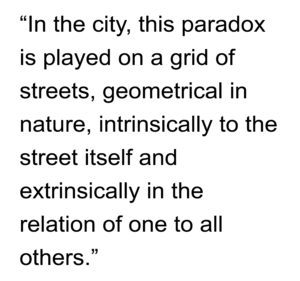 of observing that which we wish to understand and, in doing so, we become trapped within the tired dogmas of an imagined past and a condemned future.
of observing that which we wish to understand and, in doing so, we become trapped within the tired dogmas of an imagined past and a condemned future.
Dogma selects us. We do not choose the doctrine. This often (preferably) occurs independently of curiosity or wisdom and we youthfully mistake its favors as a proclamation that, indeed, we are the anointed one. It is a false image of oneself. Once a single step is taken along this path, we derive words inadequate to the object but sufficient for dogmatic pursuit in a hollow attempt to describe the nature of the city and make the understandable, the objective, into the incomprehensible, the subjective. We move backward and abnegate the hypothetical for the fanciful, the sensory for the material, and theoretical for the dogmatic. In doing so, we attempt to surround ourselves in meaning at the expense of the spatial and the urban. Theory suffocates in the vacuüm of this confrontation, embracing a void that fails the essential, instinctive construction of the city, in service to the super-ego of the individual. The urban loses balance. The real nature of the city hides behind a mask, a voice without a face, raising objections to the elementary urbane on shallow grounds of methodological peculiarities, historical reinterpretations, and narrow understandings of the relation between form and function. We must not fear to finally unmask the charlatan to unveil the bodily and mentally sensual to the masses, and declare the sensory city as a subject that is worthy of investigation and a thing demanding objective theory. In this way, the investigative and the theoretical form a synthesis to reveal the functional significance of space. Our words must have the precision and structure of whispers so that our theories carry meaning beyond the lone voice screaming to be heard above the crowd. We are the crowd, and it is our voices that matter.
On Space is a regular series of philosophical posts from The Outlaw Urbanist. These short articles (usually about 500 words) are in draft form so ideas, suggestions, thoughts and constructive criticism are welcome.

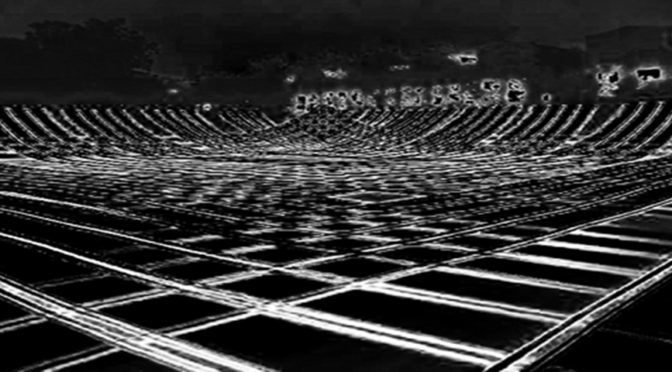
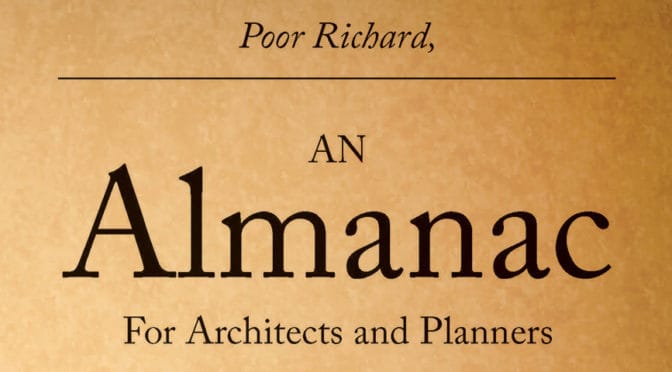

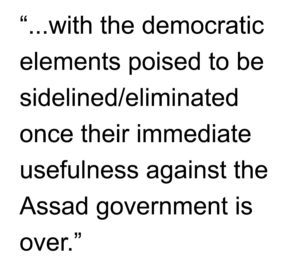 Like Libya before it, Jihadists have infiltrated the pro-democracy rebellion in Syria while Hezbollah fighters enter the country in support of the tyrannical government of Bashar al-Assad. In essence, this rebellion now pits one model of tyranny against another with the democratic elements poised to be sidelined/eliminated once their immediate usefulness against the Assad government is over. Jihadists used the grassroots, pro-democracy protests of the Arab Spring as a springboard to political power in Egypt. Now Islamic-rooted Turkey Prime Minister Recep Tayyip Erdogan’s riot police used tear gas and pressurized water hoses in a dawn raid on Friday against a peaceful sit-in to prevent the uprooting of trees at a local park. The initial protest has expanded beyond urban renewal issues to demonstrations against new laws recently enacted that restrict the sale and advertising of alcohol and public displays of affection (i.e. kissing). The implications for the West of ‘losing Turkey’ (which already has a Jihadist-tainted government) are profound.
Like Libya before it, Jihadists have infiltrated the pro-democracy rebellion in Syria while Hezbollah fighters enter the country in support of the tyrannical government of Bashar al-Assad. In essence, this rebellion now pits one model of tyranny against another with the democratic elements poised to be sidelined/eliminated once their immediate usefulness against the Assad government is over. Jihadists used the grassroots, pro-democracy protests of the Arab Spring as a springboard to political power in Egypt. Now Islamic-rooted Turkey Prime Minister Recep Tayyip Erdogan’s riot police used tear gas and pressurized water hoses in a dawn raid on Friday against a peaceful sit-in to prevent the uprooting of trees at a local park. The initial protest has expanded beyond urban renewal issues to demonstrations against new laws recently enacted that restrict the sale and advertising of alcohol and public displays of affection (i.e. kissing). The implications for the West of ‘losing Turkey’ (which already has a Jihadist-tainted government) are profound.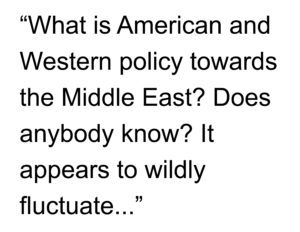 Our policy circles around the strategic signpost “to keep the oil flowing” while veering back and forth between (often mistaken) tactical assessments about what is easy (i.e. Libya, intervene; Afghanistan, surge) or what is hard (i.e. Syria, stay out of it; Iraq; get out), which is to say there is no coherent policy at all. This is no way for a “great” county and civilization (which we aspire to and often claim on behalf of the United States and Western Europe) to conduct its affairs. Given these conditions, it should not be a surprise to anyone the “huddle masses yearning to breathe free” on the Arab streets are befuddled and frustrated by the incoherent policies of the United States and Western Europe. After 9/11, the United States and Western Europe made a mistake. It was an honest mistake because it was born of anger but a mistake nonetheless. We thought Al-Qaeda’s attack was about us. It was not, it was about power. Subsequent events in the Middle East have demonstrated the agenda of the Jihadists is to achieve political power, oppress liberal-minded citizens and thought (such as Christianity), and accumulate power for its own sake. In his second augural address, George W. Bush attempted to frame the current threat on more solid footing as a struggle against tyranny, liberty versus oppression, and the dreams of freedom for the many in opposition to the pursuit of power by a few.
Our policy circles around the strategic signpost “to keep the oil flowing” while veering back and forth between (often mistaken) tactical assessments about what is easy (i.e. Libya, intervene; Afghanistan, surge) or what is hard (i.e. Syria, stay out of it; Iraq; get out), which is to say there is no coherent policy at all. This is no way for a “great” county and civilization (which we aspire to and often claim on behalf of the United States and Western Europe) to conduct its affairs. Given these conditions, it should not be a surprise to anyone the “huddle masses yearning to breathe free” on the Arab streets are befuddled and frustrated by the incoherent policies of the United States and Western Europe. After 9/11, the United States and Western Europe made a mistake. It was an honest mistake because it was born of anger but a mistake nonetheless. We thought Al-Qaeda’s attack was about us. It was not, it was about power. Subsequent events in the Middle East have demonstrated the agenda of the Jihadists is to achieve political power, oppress liberal-minded citizens and thought (such as Christianity), and accumulate power for its own sake. In his second augural address, George W. Bush attempted to frame the current threat on more solid footing as a struggle against tyranny, liberty versus oppression, and the dreams of freedom for the many in opposition to the pursuit of power by a few.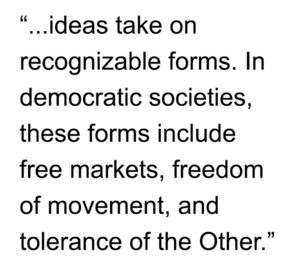 A new policy should include containment. We must develop a strategy for the Middle East to halt the expansion of Islamo-Fascism, which includes modernizing (perhaps even expanding) our nuclear deterrent and reconstituting the doctrine of having the military capacity to fight two wars simultaneously. As part of this containment strategy, we will have to recognize and accept we may lose some countries (like Egypt) along the way but, in the modern era of globalization, mass communications, and the internet, these are more likely to be temporary situations. A similar transition as witnessed during the Cold War is likely to occur at a much more rapid rate (taking years instead of decades). Finally, we must actively engage in destabilizing these tyrannical regimes by any means necessary, including clandestine activities, expanded intelligence gathering ‘on the ground’, Wi-Fi American Free (a modern adaption of the Radio Free Europe concept) and filtering financial support to grassroots democratic movements. Our view should be on the end game, not the distractions of the moment. And our end game should always be to grow the “tree of liberty” for all, lest we condemn more than 300 million people to the darkness.
A new policy should include containment. We must develop a strategy for the Middle East to halt the expansion of Islamo-Fascism, which includes modernizing (perhaps even expanding) our nuclear deterrent and reconstituting the doctrine of having the military capacity to fight two wars simultaneously. As part of this containment strategy, we will have to recognize and accept we may lose some countries (like Egypt) along the way but, in the modern era of globalization, mass communications, and the internet, these are more likely to be temporary situations. A similar transition as witnessed during the Cold War is likely to occur at a much more rapid rate (taking years instead of decades). Finally, we must actively engage in destabilizing these tyrannical regimes by any means necessary, including clandestine activities, expanded intelligence gathering ‘on the ground’, Wi-Fi American Free (a modern adaption of the Radio Free Europe concept) and filtering financial support to grassroots democratic movements. Our view should be on the end game, not the distractions of the moment. And our end game should always be to grow the “tree of liberty” for all, lest we condemn more than 300 million people to the darkness.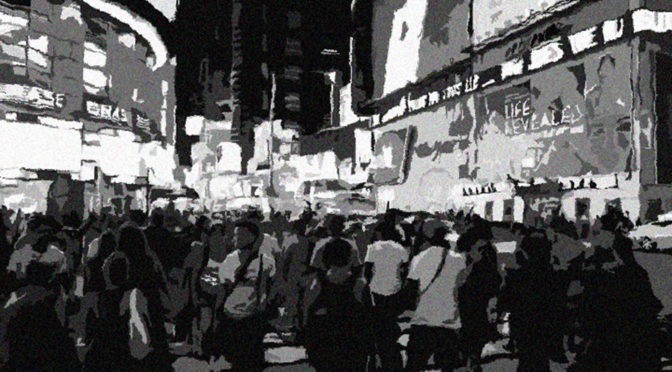
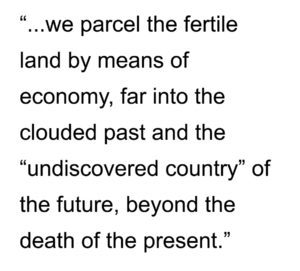 From this emerges meaning and function, a city of light and sound, movement and life, each particular in their own way but also a simulacrum of all that has come before and will arrive again. There is power in the disorder of the city and a power of magnitude to be discovered in its orderly manifestation. Neither is greater than the other nor the sum of the parts. Within this (dis)order we live and function, day to day, year to year. We shape and are shaped by the space of the city, we utilize its strategic provisions for seeing, going, and being and its infinite redundancies to pause, understand, reflect, perhaps even decide. The light we shine on the city reflects upon ourselves and, in seeking to better understand the city, we learn to incrementally know ourselves. The city is both static in the moment and dynamic across the seconds. It can be understood all at once but its parts in isolation are – often so – the genesis of intellectual aberration. The organism grows but the machine still operates and we are befuddled. The city is at once process and product, the thing already made and in the process of becoming, the Father seeding the land, the Mother birthing the child, and the child being born, a Trinity upon itself. However, this is not a Mystery of faith but a failure of understanding. We must conjecture, we must believe, we must hypothesize, and we must dissect and reassemble if we hope to intervene with wisdom in the space of the city. Let us delve into Beingness of the city to better understand its nature with hope and expectation instead of fear and trepidation. It is life revealed.
From this emerges meaning and function, a city of light and sound, movement and life, each particular in their own way but also a simulacrum of all that has come before and will arrive again. There is power in the disorder of the city and a power of magnitude to be discovered in its orderly manifestation. Neither is greater than the other nor the sum of the parts. Within this (dis)order we live and function, day to day, year to year. We shape and are shaped by the space of the city, we utilize its strategic provisions for seeing, going, and being and its infinite redundancies to pause, understand, reflect, perhaps even decide. The light we shine on the city reflects upon ourselves and, in seeking to better understand the city, we learn to incrementally know ourselves. The city is both static in the moment and dynamic across the seconds. It can be understood all at once but its parts in isolation are – often so – the genesis of intellectual aberration. The organism grows but the machine still operates and we are befuddled. The city is at once process and product, the thing already made and in the process of becoming, the Father seeding the land, the Mother birthing the child, and the child being born, a Trinity upon itself. However, this is not a Mystery of faith but a failure of understanding. We must conjecture, we must believe, we must hypothesize, and we must dissect and reassemble if we hope to intervene with wisdom in the space of the city. Let us delve into Beingness of the city to better understand its nature with hope and expectation instead of fear and trepidation. It is life revealed.
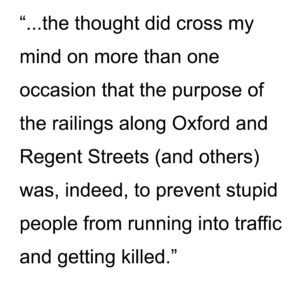 No doubt the reason I found this rant so funny was, having lived in London for 8 years, the thought did cross my mind on more than one occasion that the purpose of the railings along Oxford and Regent Streets (and others) was, indeed, to prevent stupid people from running into traffic and getting killed. Of course, this is not the case. Instead, the purpose of the railings is to corral pedestrians on the sidewalk in areas with high foot traffic (like pigs in a pen) so the majority of street space is reserved for automobile traffic. London’s railings are fundamentally anti-pedestrian, pro-automobile planning measures. God forbid if pedestrians occupy more of the street space for their use to the detriment of keeping traffic moving! So, the real purpose of the railings was to prevent stupid drivers in 5-ton death machines from killing pedestrians, awarding ‘exclusivity’ of street space to these drivers when we should be slowing the traffic down in deference to pedestrians. In the late 1990s, London has begun to learn and adjust to this lesson. When I visit London (hopefully) sometime in the next 4-6 months, I’m eager to see for myself how far they have taken the lesson over the last decade. I like to think Eddie’s satirical rant played a small role in changing the dynamic.
No doubt the reason I found this rant so funny was, having lived in London for 8 years, the thought did cross my mind on more than one occasion that the purpose of the railings along Oxford and Regent Streets (and others) was, indeed, to prevent stupid people from running into traffic and getting killed. Of course, this is not the case. Instead, the purpose of the railings is to corral pedestrians on the sidewalk in areas with high foot traffic (like pigs in a pen) so the majority of street space is reserved for automobile traffic. London’s railings are fundamentally anti-pedestrian, pro-automobile planning measures. God forbid if pedestrians occupy more of the street space for their use to the detriment of keeping traffic moving! So, the real purpose of the railings was to prevent stupid drivers in 5-ton death machines from killing pedestrians, awarding ‘exclusivity’ of street space to these drivers when we should be slowing the traffic down in deference to pedestrians. In the late 1990s, London has begun to learn and adjust to this lesson. When I visit London (hopefully) sometime in the next 4-6 months, I’m eager to see for myself how far they have taken the lesson over the last decade. I like to think Eddie’s satirical rant played a small role in changing the dynamic.